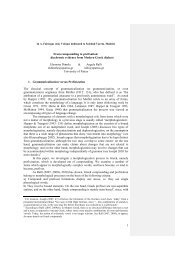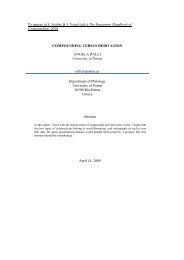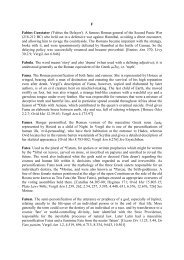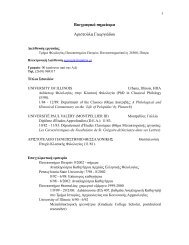Case mismatches in Greek: Evidence for the autonomy of morphology
Case mismatches in Greek: Evidence for the autonomy of morphology
Case mismatches in Greek: Evidence for the autonomy of morphology
Create successful ePaper yourself
Turn your PDF publications into a flip-book with our unique Google optimized e-Paper software.
192 manuel espaol-echevarra and angela ralli<br />
movement cha<strong>in</strong> with a genitive clitic. 13 On <strong>the</strong> o<strong>the</strong>r hand, (15cd) show that<br />
<strong>the</strong> matrix <strong>Case</strong>, Nom<strong>in</strong>ative <strong>in</strong> (15c) and Accusative <strong>in</strong> (15d), cannot surface<br />
on <strong>the</strong> relative pronoun when <strong>the</strong>re is a dative case checked <strong>in</strong>ternally to <strong>the</strong> free<br />
relative. This state <strong>of</strong> aairs straight<strong>for</strong>wardly follows from <strong>the</strong> re<strong>for</strong>mulation<br />
<strong>of</strong> Baker's <strong>the</strong>ory proposed <strong>in</strong> (10). In non-movement cha<strong>in</strong>s, as opposed to whcha<strong>in</strong>s,<br />
<strong>the</strong>re is no requirement on identity <strong>of</strong>;Interpretable features, allow<strong>in</strong>g<br />
<strong>for</strong> <strong>Case</strong> <strong>mismatches</strong> <strong>in</strong> (15ab), but not <strong>in</strong> (15cd). In addition, <strong>the</strong> contrast<br />
between obligatory <strong>Case</strong> match<strong>in</strong>g <strong>in</strong> argumental free relatives observed <strong>in</strong> (5),<br />
as opposed to its optionality <strong>in</strong> left-dislocated position also follows partially<br />
from (10). CLLD constructions, such as <strong>the</strong> one <strong>in</strong> (16b), <strong>in</strong>volve a clitic which<br />
checks <strong>the</strong> <strong>Case</strong> <strong>of</strong> <strong>the</strong> matrix verb, and, accord<strong>in</strong>g to (10) this <strong>Case</strong> does not<br />
need to surface on <strong>the</strong> relative pronoun:<br />
(16) (a) *Agapo opjos m'agapai<br />
love-1g whoever-nom me-acc-loves<br />
(b) Opjos m'agapai, ton agapo<br />
whoever-nom me-acc-loves, him-(cl)-acc love-1sg<br />
`Whoever loves me, I love him'<br />
On <strong>the</strong> o<strong>the</strong>r hand, when <strong>the</strong> free relative is <strong>in</strong> argument position, <strong>the</strong> matrix<br />
<strong>Case</strong> must be checked by <strong>the</strong> free relative constituent, so that <strong>the</strong> <strong>Case</strong> <strong>in</strong>ternal<br />
to <strong>the</strong> free relative cannot surface on <strong>the</strong> relative pronoun. The fact that nonmatch<strong>in</strong>g<br />
free relatives <strong>in</strong>volve <strong>in</strong> <strong>the</strong> general case a pronom<strong>in</strong>al element which<br />
checks <strong>the</strong> matrix <strong>Case</strong> seems to be quite general. Consider <strong>the</strong> follow<strong>in</strong>g<br />
example from Polish <strong>in</strong>volv<strong>in</strong>g Accusative matrix case and Dative <strong>in</strong> <strong>the</strong> free<br />
relative, cf. McCreight (1988, 94): 14<br />
13<br />
14<br />
In certa<strong>in</strong> cases (cf. (22) below), genitive case may alternatively surface on <strong>the</strong> relative<br />
pronoun. Thus, (i) is also possible:<br />
(i) Opjou ftasi protos, tha tu dosume ena vravio<br />
whoever-gen arrives-perf-3sg rst, fut him(cl)-gen give-perf-1pl a prize<br />
`Whoever arrives rst, we'll give him a prize'<br />
We abstract away from <strong>the</strong> fact that <strong>in</strong> many languages <strong>the</strong> pronom<strong>in</strong>al elementcheck<strong>in</strong>g<br />
matrix <strong>Case</strong> may be absent if <strong>the</strong>re is a syncretic <strong>for</strong>m <strong>of</strong> <strong>the</strong> relative pronoun that<br />
can accommodate matrix and free relative <strong>Case</strong>s, as <strong>in</strong> <strong>the</strong> Polish example <strong>in</strong> (i):<br />
(i) kupiam co byo w sklepie<br />
bought what-nom/acc was <strong>in</strong> <strong>the</strong> store<br />
`I bought whatwas <strong>in</strong> <strong>the</strong> store'<br />
For space reasons, we will not discuss ei<strong>the</strong>r cases <strong>of</strong> hierarchical resolution, cf. Harbert<br />
(1983), and McCreight (1988). Our discussion <strong>in</strong> section 2.3.1, however, is<br />
undoubtedly related to this eect.<br />
Acta L<strong>in</strong>guistica Hungarica 47, 2000










